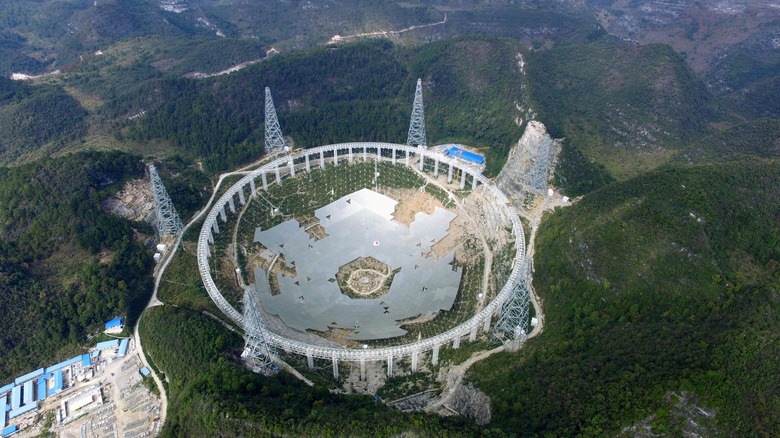This Is Why China Wants To Be The First To Find Aliens
China's Five-hundred-meter Aperture Spherical Telescope (FAST) looks like a huge, gray eye staring out of the lush mountains of Pingtang County (pictured above, under construction in 2015). It is currently the largest radio telescope in the world, and took five years to build, with work starting at the site in 2011 and completing in 2016, according to Abacus. However, preparations for it began more than two decades ago, which included the rehousing of more than 8,000 people from the local area to create a radius of "silence," according to the South China Morning Post.
According to Abacus, the telescope's day-to-day purpose is to observe deep space phenomena such as pulsars, which scientists believe can give us insight into how the universe was made and the nature of what Space.com calls "extreme states of matter."
But as FAST has opened its doors to scientists, it has become clear that pulsars aren't the only things on China's watch list. As The Atlantic reported in 2017, China's new radio telescope is also tasked with identifying signals that would confirm the existence of extraterrestrial life.
China's efforts to make first contact with alien life
In the U.S., the Search for Extraterrestrial Intelligence (SETI) program was closely associated with the beloved scientist, writer, and broadcaster Carl Sagan, who promoted SETI in his renowned TV show "Cosmos." However, as The Atlantic points out, Congress defunded the American SETI program in the 1990s, but since then, the SETI institute has been funded by private donors.
China, on the other hand, has ramped up its interest in contacting alien life, as the existence of FAST and its part of the country's SETI efforts make clear. Yet, China's interest in space is nothing new. As The Atlantic notes, the country has the world's oldest astrological tradition, dating back some 3,500 years. While stargazing may have had Chinese astronomers dreaming of other worlds, in terms of foreign policy, the country has often taken an insular approach, rejecting foreign technology and trade — a habit which likely cost them enormously on the world stage. As the 21st century reignites the space race, it appears that China is looking to be ahead of the pack.
The British scientist Stephen Hawking famously warned of the dangers of contacting alien life, a sentiment echoed by Liu Cixin, China's most famous science fiction writer and creator of the "Three-Body Problem" trilogy (per The Atlantic). However, ever since the invention of radio, the human race has been announcing itself to the cosmos. Finally, we may be ready to hear our neighbors' replies.

